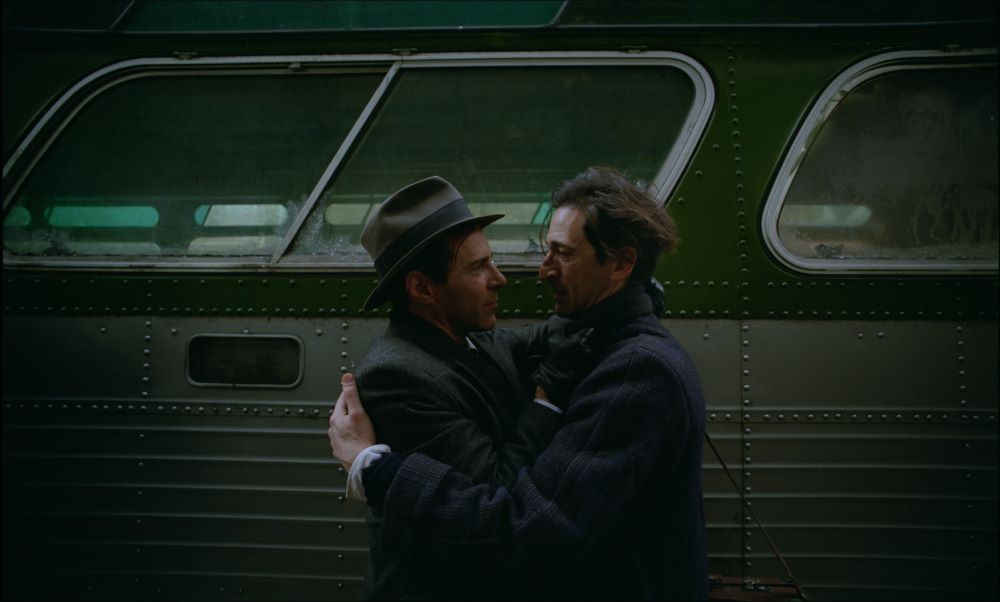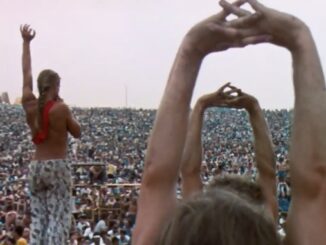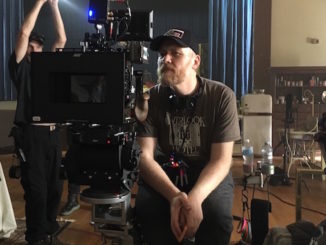The most surprising thing about Brady Corbet’s monumental new film The Brutalist is that it is neither an adaptation nor based on a true story.
Epic, literary, and intelligent, it has the look and feel (and runtime) of a literary adaptation, and yet stands on its own as an entirely original cinematic creation. It is, quite frankly, shocking that an original work such as this has been breathed into existence, in this form, in 2024, and yet here we are.
The first and last truly great, mature film of the year, The Brutalist is easily one of the finest ruminations on American id – and ego – since Paul Thomas Anderson’s 2012 masterpiece The Master. The tale of a visionary architect struggling against obstacles both internal and external, The Brutalist dares to suggest there’s a crack in the foundation of postwar America, and that this crack is spreading.
At 215 minutes (with built-in intermission), it’s an epic that begs to be seen on the big screen, ideally in the rare 70 mm print which will be running at the TIFF Lightbox this holiday season.

As far as I can tell, writer-director Brady Corbet is neither an architect, nor Hungarian, nor Jewish, and yet Corbet – along with co-screenwriter Monica Fastvold – has managed to craft something which speaks to all three facets of The Brutalist’s identity, as embodied by lead character László Tóth (Adrien Brody).
Tóth is a Jewish-Hungarian architect who, in the film’s enthralling opening sequence, arrives on Ellis Island – to visions of an inverted Statue of Liberty, no less – on a boatload of postwar refugees in 1947. Interestingly, New York is not his destination, as he’s soon boarded a bus to Philadelphia, home to a cousin (Alessandro Nivola) and his gentile wife (Emma Laird) who run a furniture shop. That too proves a temporary home, as Tóth eventually finds himself in the rural exurb of Doylestown, Pennsylvania, home to wealthy benefactor Harrison Lee Van Buren (Guy Pearce).
That New York, centre of the universe, is merely a waystation on Tóth’s hero’s journey is one of several nice touches in this film, which admirably avoids cliché and mostly shows restraint with its subject matter, that subject matter being no less than the American Dream. Even Doylestown, The Brutalist suggests, can be the locus of creative genius and a place where titans clash.
FROM BAUHAUS TO OUR HOUSE
The Brutalist is about many things, above all the act of creation.
But to reduce The Brutalist to mere allegory does a disservice to the very specific time and place Corbet is working with, and the very specific character he has invented, i.e., a Jewish outsider striving to carve out a place for himself in 1950s America. Tóth is the core of this film, with Adrien Brody (in what will surely be an Oscar-nominated performance) fully inhabiting a character who is at once a bundle of contradictions – a genius who makes dumb choices, a survivor who harms himself – and an artist with a clear, uncompromising vision.
We spend nearly the entirety of this three-and-a-half-hour film with Brody on screen, and he earns every minute of it. Brody, whose mother is Jewish-Hungarian, clearly gave his all for this performance, and it shows. Even his Hungarian accent is accurate, though one suspects there’s some dubbing involved in the scenes where he actually speaks Hungarian.
Pearce is also very good as Van Buren, the conservatively minded industrialist – his line of work is left somewhat obscure, though we learn he owns at least one rail line and a shipping company – who initially recoils against Tóth’s designs, before realizing the cachet he can acquire by attaching himself to Tóth. Like many a wealthy philanthropist before him, Van Buren’s lack of a creative instinct leads him to purchase it from others: if he can’t make art himself, at least he can own the artist.
BIGGER THAN LIFE
The Brutalist is not without its weaknesses.
Some of the writing is clumsy or obvious, Corbet/Fastvold forgetting the writer’s edict to show, not tell. This is especially true for the film’s handful of too-eloquent monologues, although the script, to its credit, lampshades these moments by having other characters comment on the speechifying.
The Brutalist’s female characters are thinly drawn, a problem that’s particularly pronounced with Tóth’s wife Erzsébet (Felicity Jones), who does not appear until after the intermission, and isn’t given nearly enough to do. It doesn’t help that, unlike Brody, Jones neither looks nor sounds particularly Hungarian.
That said, in a film full of actors doing accents – Australian Guy Pearce as American, American Adrien Brody and Brit Felicity Jones as Hungarians – it’s Joe Alwyn’s absurd attempt at a Mid-Atlantic accent which is the most distracting. He sounds like a cartoon Cary Grant.
Corbet’s decision to split the film into two parts is also risky, since it inevitably invites comparison: the first half is simply more exciting, better constructed, and more realistic than everything that follows. Indeed, a morbidly dark turn in the second half – Corbet giving too-literal meaning to the film’s themes in a single, wildly unnecessary scene – threatens to derail the film entirely, though Brody’s performance saves it from teetering over the edge.
Still, it’s the latter part of the film where everything coalesces, particularly with its gut-punch of an ending which instantly throws a long retrospective shadow over the preceding 215 minutes. (It might seem hard to believe after three-and-a-half-hours, but it will probably make you want to rewatch the film right away.)
The Brutalist is also one of those “complete” films, in the sense that no aspect of the production has been overlooked. The soundtrack is phenomenal, whether it’s Daniel Blumberg’s ominous recurring theme, or the excellent period-accurate song selections. The cinematography, on 70mm VistaVision, is impressive and makes full use of an ultra-widescreen format which hasn’t been used in Hollywood in fifty years(!). Cinematographer Lol Crawely has an eye for striking visuals, whether it’s the slow trickle of water down the face of an uncut slab of marble, or the foreboding stillness of a flooded underground chamber. The production design is, of course, spectacular, with some “wow” moments earned purely off the reveal of a Tóth design realized in a physical space.
THE NON-CONFORMIST
There are shades of Fellini, Bergman, and especially Bertolucci (his own brutalist masterpiece The Conformist looming large over this one) in The Brutalist, but it’s a line from Coppola that sprung to mind while I was thinking about this film afterwards: “I believe in America.”
These are the first words you hear in The Godfather, uttered by Amerigo Bonasera, moments before asking Don Corleone to arrange the murder of the men who assaulted Bonasera’s daughter. That’s a hell of a darkly ironic note to start a film on, suggesting that everything which follows – the brutality, the betrayals, the excess – is the “America” of which Bonasera speaks. It’s a line that could easily have found its way into The Brutalist, with its cast of refugees, visionaries, drug addicts, nouveaux riches, and others grasping towards the (false) promise of America.
It’s also a sentiment which must be taken with a large grain of salt: these characters may believe in America, but it’s an America of violence and of hypocrisy, and it’s an America which doesn’t necessarily believe in them. In The Brutalist, that proves especially true for the Jewish characters, who have fled antisemitism in its most extreme manifestation, only to arrive in a country where similar sentiments bubble just below the service.
Coppola, whose own depiction of a visionary architect happens to be one of the worst films I saw this year, knows a thing or two about the American Dream deferred. If The Brutalist represents a passing of the torch of sorts, however coincidental, then Brady Corbet has earned that torch, upside-down Statue of Liberty and all.
****
The Brutalist opens December 25, 2025, at TIFF Lightbox. Certain screenings in 70mm, double-check the website.



